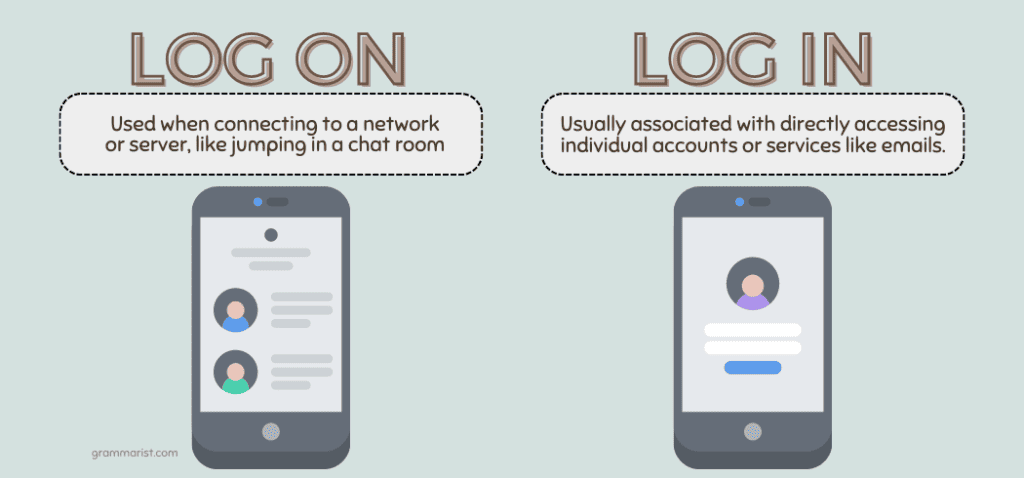In our ever-expanding digital age, we throw around terms like “log in” and “log on” in the same contexts, but do they actually mean the same thing? Yes and no. To organize the facts and clear up any confusion, I’ll go over the actual meanings of “log in” and “log on,” discuss their differences, and show you the various ways to use them.
And, just to make things even easier for you, I’ve thrown in some helpful synonyms and sentence examples! Let’s get started!
Log On or Log In: What’s the Difference?

Most people think that “log in” and “log on” can be used interchangeably, and essentially, they can without anyone being the wiser. But there’s a minor difference between the two.
“Log on” is more commonly used when connecting to a network or server, like jumping in a chat room or jumping online to play a game of Fortnite or something.
But the term “log in” is usually associated with directly accessing individual accounts or services like emails and such.
As for “login” and “logon,” they can be used as single-word nouns.
- Your login details are incorrect.
- Remember your logon credentials.
But they should be written as two words when you’re using them as verbs.
- Please log in to your account.
Also, there is no need to hyphenate these terms.
The Meaning of Logging In
The term “log in” is meant to describe the process of a person gaining access to a computer system or network by providing a username and password or other credentials.
Just think about opening up your email accounts or social media platforms. Usually, you need to input your username and password. That in itself is logging in.
Is It Log into or Log in To?
If you’re using the term “log in” as a verb, it should be followed by the word “to,” as in “Please log in to your account.”
The term “log into” is more informal but can be used in instances like texting or something. It’s not technically correct, but I’ve seen it thrown around.
Is Login Past Tense?
“Login” isn’t even a verb, so you can’t use it in a past tense form. The past tense of “log in” is “logged in,” as in “I logged in to my email account earlier.”
Log On Synonyms
- Connect
- Access
- Sign on
- Join
Log In Synonyms
- Sign in
- Authenticate
- Access
- Enter
Log In Examples in a Sentence
- Please log in to your account to view your order history of books.
- I logged in to the online forum of screenwriters to join the discussion surrounding the WGA strike.
- When a person signs in, they’re logging in.
- Candace couldn’t log in because she forgot her password for the hundredth time.
- After multiple failed attempts, Candace was locked out of her Ingram account and couldn’t log back in.
Login Examples in a Sentence

- Your login credentials have been sent to your email address so you can update your password.
- As a measure of safety and security, incorrect login details and user credentials will always prevent you from accessing the system.
- Candace hated that she had to create a new login after her banking account was compromised.
- The login process for the new social media platform was quick and easy to complete.
Log On Examples in a Sentence
- Matt tried to log on to the company’s network but couldn’t connect for some reason.
- After logging on, I accessed the shared files from the client.
- The IT department resolved the issue I was having, and everyone could finally log on again.
It’s All Technical
That should clear up any confusion you had over using the terms “log in” and “log on.” Just remember that “log in” is like signing in, and “log on” is like joining in. Let me know if you’ve got any questions, and be sure to check out my other helpful grammar guides!
Check out some other articles we covered:
